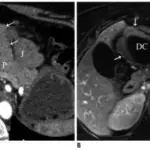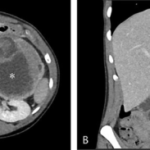Agenesis of the pancreas is a very rare condition in which the is a total absence of the pancreas.
What is the Pathology of Agenesis of the Pancreas?
The pathology of agenesis of the pancreas is due to an absence of pancreas.
-Etiology: The cause of agenesis of the pancreas is the mutation in the IPF1 gene on chromosome 13q12.1.
-Genes involved: IPF1 gene
-Pathogenesis: The sequence of events that lead to agenesis of the pancreas is atypical embryogenesis due to developmental failure of the dorsal pancreas and the mutation in the IPF1 gene on chromosome 13q12.1. This resultis in the complete or partial absence of the pancreas.
-Morphology: The morphology associated with agenesis of the pancreas shows partial or complete absence of pancreas.
-Histology: None.
How does the Agenesis of the Pancreas Present?
Patients with agenesis of the pancreas are typically rare present at the age range of neonatal and infant. The symptoms, features, and clinical findings associated with agenesis of the pancreas include pancreatitis, epigastric pain, diabetes mellitus, and hyperglycemia in a minority group. It is generally asymptomatic in most cases.
How is Agenesis of the Pancreas Diagnosed?
Agenesis of the pancreas is diagnosed via ultrasonographic imaging (USG), endoscopic ultrasound (EUS), magnetic resonance (MR), and computed tomography (CT).
How is Agenesis of the Pancreas Treated?
Agenesis of the pancreas is treated through the management of Diabetes and exocrine deficiency.
What is the Prognosis of Agenesis of the Pancreas?
The prognosis of agenesis of the pancreas is fair depending on the quality of treatment.



